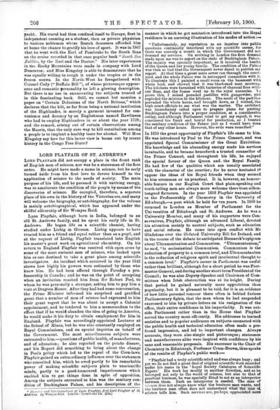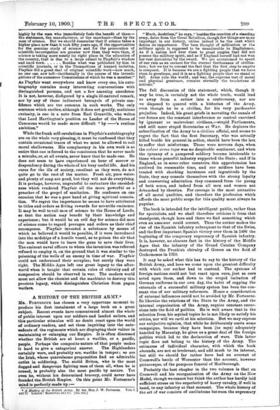LORD PLAYFAIR OF ST. ANDREWS.*
LORD PLAYFAIR did not occupy a place in the front rank of Euglish men of science, nor was he a statesman of the first order. He might have made a name in science, but he early turned aside from his first love to devote himself to the application of science to the needs of society. The main purpose of his life, and he pursued it with untiring energy, was to ameliorate the condition of the people by means of the discoveries of science. He occupied, therefore, a separate place of his own in the history of the Victorian era, and many will welcome the biography, or autobiography, for the volume is mainly autobiographical, which has appeared under the skilful editorship of Sir Wemyss Reid.
Lyon Playfair, although born in India, belonged to an old St. Andrews family, and he spent his early life in St. Andrews. He began life as a scientific chemist, having studied under Liebig in Giessen. Liebig appears to have treated him as a friend and equal rather than as a pupil, and at the request of Liebig, Playfair translated into English his master's great work on agricultural cbe mietry. 04 his return to England Playfair was received with open arms by some of the most eminent men of science, who looked upon him as one destined to take a great place among scientific investigators. An incident which occurred in the year 1842 shows how highly his powers were estimated by those who knew him. He had been offered through Faraday a pro- fessorship in Canada ; and he was on the point of accepting when an invitation reached him from Sir Robert Peel, to whom he was personally a stranger, asking him to pay him a visit at Drayton Manor. After they had had some conversation, the Prime Minister informed his surprised and gratified guest that a number of men of science had expressed to him their great regret that be was about to accept a Colonial appointment, and he tendered to him a memorandum to the effect that if he would abandon the idea of going to America, he would make it his duty to obtain employment for him in England. Playfair was accordingly appointed Lecturer at the School of Mines, but he was also constantly employed on Royal Commissions, and on special inquiries on behalf of the Government. The most miscellaneous subjects were entrusted to him,—questions of public health, of manufactures, and of education ; he also reported on the potato disease, and his Report did something to bring about the change in Peel's policy which led to the repeal of the Corn-laws. Playfair gained an extraordinary influence over the statesmen who consulted him, which he owed partly to his remarkable power of making scientific subjects plain to unscientific minds, partly to a good-humoured imperiousness which enabled him to get things done in spite of opposition. Among the subjects entrusted to him was the sanitary con- dition of Buckingham Palace, and his description of the • 310noi,, and Coriespondence of Lyon Playfair, first Lord Piayfair of St. Andrews. 1.'y 'Wealps Reid. London : Cassell and Co. (21s.] manner in which he got sanitation introduced into the Royal residence is an amusing illustration of his modes of action :- "Unfortunately, my reputation as an inquirer into public questions continually interfered with my scientific career, for there was scarcely a month in which the Government did not demand my services. On arriving in London the first demand made upon me was to report on the state of Buckingham Palace. The inquiry was specially important, as it involved the health of the Queen and her young family. The condition of the Palace was then so bad that the Government never dared to publish my report. At that time a great main sewer ran through the court- yard, and the whole Palace was in untrapped connection with it. To illustrate this I painted a small room on the basement with white lead, and showed that it was blackened next morning. The kitchens were furnished with batteries of charcoal fires with- out flues, and the fumes went up to the royal nurseries. '1 o prove this, I mixed pounded pastilles with gunpowder, and exploded the mixture in the kitchens. The smell of the pastilles pervaded the whole house, and brought down, as I wished, the high court officials to see what was the matter. The architect was immediately called upon to prepare plans for putting Buckingham Palace into a proper condition, at a considerable outlay, and although Parliament tried to get my report, it was considered too frank and brutal for production, as I treated the sanitary condition of the Palace just as I would have done that of any other house. However, the evils were remedied."
In 1850 the great opportunity of Playfair's life came to him. He was introduced by Peel to the Prince Consort, and was appointed Special Commissioner of the Great Exhibition.
His knowledge and his abounding energy made his services invaluable, and he became henceforth a trusted counsellor of the Prince Consort, and throughout his life, he enjoyed the special favour of the Queen and. the Royal Family. He had few of the qualities which are usually associated with the character of the courtier; for be never hesitated to oppose the ideas of his Royal friends when they seemed to him erroneous or un practical. It is, however, an honour- able feature in our English Court that plain-speaking and truth-telling men are always more welcome there than silken.
tongued flatterers. In the year 1858 Playfair was appointed to the Professorship of Chemistry in the University of
Edinburgh,—a post which he held for ten years. In 1868 he returned to London as Member of Parliament for the Uni versities of Edinburgh and St. Andrews. As he was a University Member, and many of his supporters were Con- servatives, Playfair, although an advanced Liberal, devoted his attention mainly to neutral subjects, such as education and social reform. He came into open conflict with Mr Gladstone over the ill-fated University Bill for Ireland, and in the course of the debate he anticipated Bismarck's epigram about Ultramontanism and Communism. "Ultramontanism," he said, "is ecclesiastical Communism. Communism is the reduction of property to a common level, and Ultramontauism is the reduction of religious spirit and intellectual thought to a common level." Playfair's career in Parliament was useful rather than brilliant, although for a short period he was Post- master-General, and daring another short term Presidentof the Council; he was also Deputy-Speaker and Chairman of Com- mittees when Irish obstruction was at its height. Daring that period he gained naturally more opprobrium than popularity, but it is pleasant to be told, for it is an evidence of how little personal rancour there often is behind furious Parliamentary fights, that the men whom he had suspended expressed to him by private letters on his resignation of the office, their entire confidence in his impartiality. It was out- side Parliament rather than in the House that Playfair served the country most efficiently. His addresses to learned societies and to popular audiences on subjects connected with the public health and technical education often made a pro- found impression, and led to important changes. Always. accurate, they were also simple and picturesque ; statesmen and manufacturers alike were inspired with confidence by his sane and reasonable proposals. His successor in the Chair of Chemistry in Edinburgh, Professor Crum-Brown, thus speaks of the results of Playfair's public work "Playfair had a truly scientific mind and was always busy; and yet we do not find a great deal of original scientific work recorded under his name in the Royal Society Catalogue of Scientific Papers.' His work lay mostly in another direction, and as he belonged not only to the world of science, but also to that of practical business, he was specially fitted to act as an interpreter between them. Such an interpreter is needed. The man of does not always know what the business man wants, and the business man often does not understand what -the- than science tells him. Such services are, psi haps, appreciated more
highly by the man who immediately feels the benefit of them— the statesman, the manufacturer, or the merchant—than by the man of science. But we should remember that if science takes a higher place now than it took fifty years ago, if the opportunities for the genuine study of science and for the prosecution of scientific investigation are greater now than they were then, if science le taking more nearly its right place in the education of the country, that is due to a large extent to Playfair's wisdom
and hard work Besides what was published by him in scientific journals, or in the Transactions of learned societies, Playfair did a great deal of original scientific work—how much, no one can now tell—incidentally in the course of the investi- gations of the numerous Commissions of which he was a member."
As Playfair went everywhere and knew every one, his auto- biography contains many interesting conversations with distinguished persons, and not a few amusing anecdotes. It is not, however, disfigured by a single ill-natured remark, nor by any of those indiscreet betrayals of private con- fidence which are too common in such works. The only
sentence which excites, although it does not gratify, malicious curiosity, is one in a note from Earl Granville, who writes that Lord Hartiugton's position as Leader of the House of Commons would be made more difficult "by —'s restless ambition."
While the frank self-revelations in Playfair's autobiography are on the whole very pleasing, it must be confessed that they contain occasional traces of what we must be allowed to call moral shallowness. His complacency in his own work is so entire that one is forced to the conclusion that he never made a mistake, or, at all events, never knew that he made one. He does not seem to lose experienced an hour of sorrow or despondency daring the whole of his busy useful life. And his cures for the ills of society, excellent as they were, do not quite go to the root of the matter. Fresh air, pure water, and plenty of soap are good, but they will not do everything. It is perhaps, however, ungrateful to caricature the onesided- nese which rendered Playfair all the more powerful as a preacher of the gospel of sanitation. He confesses on one occasion that he was a poor hand at giving spiritual consola. tion. We regret the importance he seems to have attributed to titles and orders as fitting rewards for scientific eminence. It may be well to call men of science to the House of Lords, so that the nation may benefit by their knowledge and experience; but it would be an evil day for science did men
of science come to regard peerages and orders as their chief recompense. Playfair invented a substance by means of which he believed it would be possible, if it were introduced into the midships of a hostile vessel, so to poison the air that the men would have to leave the guns to save their lives. The eminent naval officers to whom the invention was referred refused to employ it, on the ground that it was similar to the poisoning of the wells of an enemy in time of war. Playfair could not understand their scruples ; bat surely they were right. The Middle Ages left one great legacy to the after- world when it taught that certain rules of chivalry and of compassion should be observed in war. The modern world must not allow the chemist and the machinist to destroy this precious legacy, which distinguishes Christian from pagan warfare.



































 Previous page
Previous page